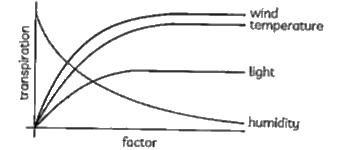The rate of evaporation decreases with increases in humidity.
Step-by-Step Text Solution:
1. Understanding Evaporation:
- Evaporation is the process where liquid molecules gain enough energy to enter the gaseous phase. This occurs at the surface of the liquid.
2. Role of Humidity:
- Humidity refers to the amount of water vapor present in the air. When the air is humid, it means that it already contains a significant amount of water vapor.
3. Effect of Increased Humidity on Evaporation:
- When humidity increases, the air becomes saturated with water vapor. This saturation means that the air cannot hold any more water vapor, which leads to a decrease in the rate of evaporation from the liquid surface.
4. Molecular Movement:
- In humid conditions, the concentration of water vapor in the air is high. This creates a situation where the molecules of water in the liquid have a harder time escaping into the air because the air is already filled with water molecules.
5. Conclusion:
- Therefore, as humidity increases, the rate of evaporation decreases. This is because the air's capacity to accept more water vapor is limited, leading to a lower rate of transition from the liquid phase to the gaseous phase.
- Evaporation is the process where liquid molecules gain enough energy to enter the gaseous phase. This occurs at the surface of the liquid.
- Humidity refers to the amount of water vapor present in the air. When the air is humid, it means that it already contains a significant amount of water vapor.
- When humidity increases, the air becomes saturated with water vapor. This saturation means that the air cannot hold any more water vapor, which leads to a decrease in the rate of evaporation from the liquid surface.
- In humid conditions, the concentration of water vapor in the air is high. This creates a situation where the molecules of water in the liquid have a harder time escaping into the air because the air is already filled with water molecules.
- Therefore, as humidity increases, the rate of evaporation decreases. This is because the air's capacity to accept more water vapor is limited, leading to a lower rate of transition from the liquid phase to the gaseous phase.
Topper's Solved these Questions
- NATURE OF MATTER BOOK - PEARSON IIT JEE FOUNDATIONCHAPTER - NATURE OF MATTER EXERCISE - LEVEL 2
22 Videos
- NATURE OF MATTER BOOK - PEARSON IIT JEE FOUNDATIONCHAPTER - NATURE OF MATTER EXERCISE - LEVEL 3
10 Videos
- NATURE OF MATTER BOOK - PEARSON IIT JEE FOUNDATIONCHAPTER - NATURE OF MATTER EXERCISE - ESSAY TYPE QUESTIONS
4 Videos
- METALS AND NON-METALSBOOK - PEARSON IIT JEE FOUNDATIONCHAPTER - METALS AND NON-METALSEXERCISE - Level-3 Concept Application
10 Videos
- Organic ChemistryBOOK - PEARSON IIT JEE FOUNDATIONCHAPTER - Organic ChemistryEXERCISE - Level 3
9 Videos
Similar Questions
Comment on the following statements.
(a) Evaporation produces cooling.
(b) Rate of evaporation of an aqueous solution decreases with increases with increase in humidity .
(c) Sponge though compressible is a solid.
View SolutionYhe rate of chemisorption
a. increaeses with decreases in temperature
b. increases with increasesin tempreture
c. increases with decreases in the pressure of gas
d. is independent of the pressure of gas
View Solution
Knowledge Check
The rate of evaporation increases with
Adecrease in temperatureBincrease in temperatureCincrease in volume of liquidDdecrease in volume of liquid.A plot of various abiotic factors affecting the rate of transpiration is given below :

After analyzing the graph a student writes the following statements
(I) The rate of transpiration increases with increase in light intensity, wind speed and humidity
(II) The rate of transpiration decreases linearly with increases in light intensity , temperature and humidity
(III) The rate of transpiration decreases with increase in humidity
(IV) The rate of transpiration increases with increase in light intensity, temperature and humidity
Choose from the following which of the following would be the correct statements (s)AOnly (I)BOnly (II)COnly (III)DBoth (I) and (IV). Assertion: The velocity of sound increases with increases in humidity.
Reason: Velocity of sound does not depend upon the medium.Aif both the assertion and reason are true and reson is a true explanation of the assertion.Bif both the assertion and reason are true but the reason is not the correct explanation of assertion.CIf the assertion is true but reason is false.DIf both the assertion and reason are false.
. Assertion: The velocity of sound increases with increases in humidity.
Reason: Velocity of sound does not depend upon the medium.
View SolutionRate of evaporation of water
View SolutionRate of evaporation of water
View SolutionRate of evaporation of water
View SolutionThe rate of transpiration increases with the decrease of
View Solution
